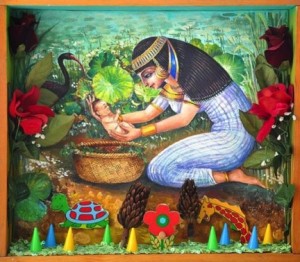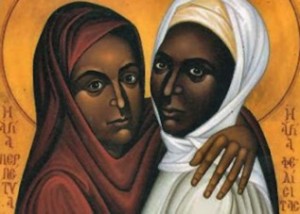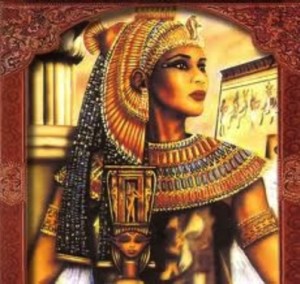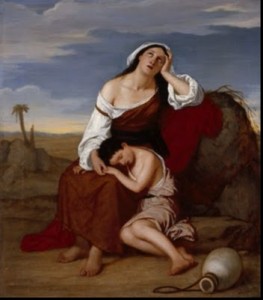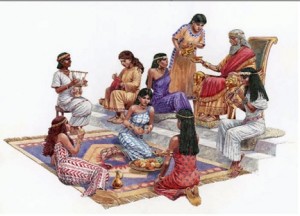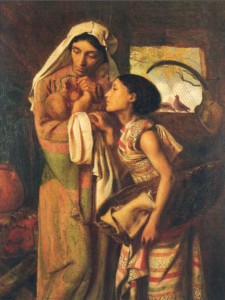Once Moses’ mother, Jocheved, paradoxically obeyed Pharaoh and “threw” her son in the Nile, Pharaoh’s daughter discovered the baby. Moses’ sister followed the basket and offered the king’s daughter suggestions on how to care for the child. Daughters are prominent in this part of the story, the word occurring six times. “Certainly our attention is being drawn to the ironic connection between Pharaoh’s intent to spare the daughters and the fact that a succession of daughters, the last being his own, contributes to his undoing” (Ackerman, p.95). Overall women dominate the first chapters of Exodus prompting us to wonder about the significance of women in ancient Israelite storytelling. “The question is not why does a story of daughters form the prelude to the exodus, but rather: what effect do these stories about women have on the way we read the exodus story as a whole?” (Exum, p. 60). In particular, I want to explore the way in which the king of Egypt’s own daughter determined the outcome of the story of the exodus. Continue reading Pharaoh’s Daughter
Tag Archives: Egyptian women
Shiphrah & Puah: The Midwives who Delivered Israel
“The king of Egypt spoke to the Hebrew midwives, one of whom was named Shiphrah and the other Puah, saying, ‘When you deliver the Hebrew women, look at the birthstool: if it is a boy, kill him; if it is a girl, let her live.’ The midwives, fearing God, did not do as the king of Egypt had told them; they let the boys live.” (Exodus 1:15-17)
Disturbed by the proliferation of the Hebrew people he had enslaved, the unnamed Pharaoh directed two named women to carry out a gendered genocide. By leaving him anonymous, the writer signals that the king is powerless and does not deserve to be named. As we shall see, the “midwives alone earn themselves a name by their conduct” (Siebert-Hommes, Let, pp. 113). Not only have Puah and Shiphrah been remembered throughout the generations, but the fact that they are actually named may indicate that they were national figures within Egyptian society. Continue reading Shiphrah & Puah: The Midwives who Delivered Israel
Asenath: The Seventh Matriarch
“Pharaoh then gave Joseph the name Zaphenath-paneah; and he gave him for a wife Asenath daughter of Poti-phera, priest of On… Before the years of famine came, Joseph became the father of two sons, whom Asenath daughter of Poti-phera, priest of On, bore to him.” Genesis 41:45, 50 (cf. 46:20).
The wife of Joseph, Asenath (Hebrew Asnat) is mentioned only in passing in Genesis. Her names means “she belongs to Nut [also known as Neith],” an Egyptian god of death and rebirth. Continue reading Asenath: The Seventh Matriarch
Hagar’s Exodus and Exile
Hagar is the only person in the Bible to give God a name and the only woman to be promised a nation. “None of the mothers of Israel is her equal in this regard” (Fischer, p.18). Yet she is subjected to some of the greatest degradation in the scriptures. Her story has even been used to sanction slavery. White American slaveholders in the mid-1800s took God’s command to Hagar “Return, submit,” as legitimizing the slavery system. But the same text has been a source of hope for liberation by African American communities. Continue reading Hagar’s Exodus and Exile
Solomon’s Egyptian Wife
Deut. 17:15 -17 admonishes the people of Israel to not let their king, probably Solomon, have lots of wives. Since the patriarchs and King David were polygamists, this critique of King Solomon seems unwarranted at first reading. As I explored all the references to Solomon’s wives and concubines I found varied and contradictory assessments of the king, from expressions of national pride to severe condemnation, particularly for his marriage to Pharaoh’s daughter. Since Pharaoh’s daughter is the first mentioned in the list of Solomon’s wives in 1 Kings 11:1, she came to symbolize Solomon’s harem as a whole (Reinhartz, Why, p.25). Continue reading Solomon’s Egyptian Wife
Jochebed: The Ark Builder
In a study of the many woman of Exodus, the first women we encounter are the midwives Puah and Shiprah. In an attempt to control the Hebrew population of slaves, the king of Egypt commanded the midwives to kill all the Hebrew boys as they were born. The midwives make up a story about how quickly Hebrew women give birth and thereby thwart Pharaoh’s plan. If it weren’t for their defiance, Moses would not have lived. Continue reading Jochebed: The Ark Builder

